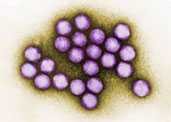Clinical Overview

Colorized transmission electron micrograph of adenovirus.
Adenoviruses are medium-sized (90-100 nm), non-enveloped icosohedral viruses with double-stranded DNA. More than 50 types of immunologically distinct adenoviruses can cause infections in humans. Adenoviruses are relatively resistant to common disinfectants and can be detected on surfaces, such as doorknobs, objects, and water of swimming pools and small lakes.
Adenoviruses most commonly cause respiratory illness. The illnesses can range from the common cold to pneumonia, croup, and bronchitis. Depending on the type, adenoviruses can cause other illnesses such as gastroenteritis, conjunctivitis, cystitis, and, less commonly, neurological disease.
Infants and people with weakened immune systems are at high risk for developing severe illness caused by adenovirus infection. Also, adenoviruses commonly cause acute respiratory illness in military recruits, although the frequency has significantly decreased since the reinstitution in March 2011 of the adenovirus vaccine administration.
Some people infected with adenoviruses, especially those who have weakened immune systems, can have ongoing infections in their tonsils, adenoids, and intestines that do not cause symptoms. They can shed the virus for weeks or longer.
For more information, see
- Page last reviewed: May 23, 2017
- Page last updated: May 23, 2017
- Content source:


 ShareCompartir
ShareCompartir